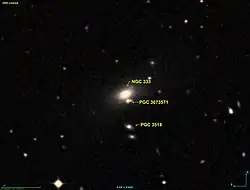NGC 333
NGC 333 is a lenticular galaxy located approximately 755 million light years away[5] in the constellation Cetus. It was discovered in 1877 by Wilhelm Tempel. It is recorded as NGC 333 in the New General Catalogue. This is a list of deep space objects that was compiled by John Louis Emil Dreyer in 1888 in an update to John Herschel earlier catalogue. It has a companion galaxy, named PGC 3073571, which is presumed to be a physical pair of NGC 333.[5]
| NGC 333 | |
|---|---|
 DSS image of NGC 333 | |
| Observation data (J2000 epoch) | |
| Constellation | Cetus |
| Right ascension | 00h 58m 51.2s[1] |
| Declination | −16° 28′ 13″[1] |
| Redshift | 0.055671[2] |
| Helio radial velocity | 16226 km/s[2] |
| Distance | 638.9 Mly (195.88 Mpc)[3] |
| Apparent magnitude (B) | 14.90[4] |
| Characteristics | |
| Type | S0[1] |
| Apparent size (V) | 1.6' × 1.0'[1] |
| Other designations | |
| PGC 3519[2] | |
Location
The NGC 333's location is 00 58 51.2987945616 (R.A.) and -16 28 08.952040380 (Dec.). The Right Ascension is the angular distance of an object along the celestial equator from the March Equinox. As rough guide, the location is located in the constellation of Pisces. If the number is negative, it is "west" of the March Equinox. The Declination is the angle of the object from the celestial equator. A negative value indicates it is in the southern hemisphere.
Attributes of NGC 333
The Radial Velocity, that is the speed at which the object is moving away/towards the Sun is 16226 km/s . When the value is negative then the deep space object and the Sun are getting closer to one another, likewise, a positive number means that the two objects are moving away.
Angular Size
The Angular Size is the size given as arc minutes which can be roughly turned into light years if you know the distance to the object. Formula is Distance * Tan ((MA/60)/(180/Pi)) MA is the Major Axis value. It probably won't give you a peer reviewed size but it'll give you an idea of how big it is. Distance can be whatever measurement you want, Parsec, LightYears, MegaParsecs.
- 0.663 is the major axis of the object, the length.
- 0.491 is the minor axis of the object, the width.
- 120 is the angle of orientation of NGC 333.
- C is an indicator of quality, A being the best quality and E being the worst.
References
- "NASA/IPAC Extragalactic Database". Results for NGC 0333. Retrieved September 2, 2016.
- "NGC 333". SIMBAD. Centre de données astronomiques de Strasbourg. Retrieved February 19, 2021.
- Tully, R. Brent; Courtois, Hélène M.; Sorce, Jenny G. (2016). "Cosmicflows-3". The Astronomical Journal. 152 (2): 21. arXiv:1605.01765. Bibcode:2016AJ....152...50T. doi:10.3847/0004-6256/152/2/50. 50.
- "Search specification: NGC 333". HyperLeda. Université Claude Bernard Lyon 1. Retrieved February 19, 2021.
- "New General Catalog Objects: NGC 300 - 349". Cseligman. Retrieved November 1, 2016.